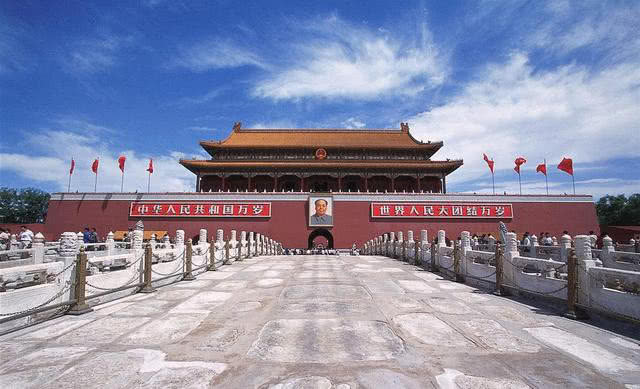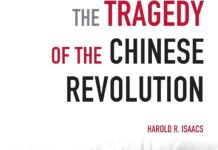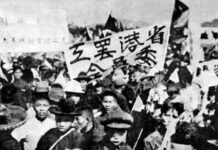Since the restoration of capitalism and its rise to become the second largest economy in the world, China has become a major player in the global capitalist system
Peter Chan, Socialist Action (Hong Kong)
At a time when the United States and China are locked in a historic conflict, the question of whether or not China is imperialist has become a hotly debated issue amongst the left internationally. This article aims to clarify some of the misconceptions, in order for us to draw the correct political conclusions. In discussing imperialism, we must first be clear about the Marxist definition of it. Let us recall Lenin’s definition in Imperialism, the Highest Stage of Capitalism:
“If it were necessary to give the briefest possible definition of imperialism we should have to say that imperialism is the monopoly stage of capitalism. Such a definition would include what is most important, for, on the one hand, finance capital is the bank capital of a few very big monopolist banks, merged with the capital of the monopolist associations of industrialists; and, on the other hand, the division of the world is the transition from a colonial policy which has extended without hindrance to territories unseized by any capitalist power, to a colonial policy of monopolist possession of the territory of the world, which has been completely divided up.”
Therefore, what we are referring to is not the purely military mainstream definition, but as a political-economic concept. It is the result of the inevitable tendency of capitalism to develop beyond the borders of the nation-state at its highest level. Lenin also identified five basic features of imperialism, which we can see if they fit with today’s China.
(1) The concentration of production and capital has developed to such a high stage that it has created monopolies which play a decisive role in economic life.
There is no doubt about the extent of the concentration of production and capital in China today: for the second year in a row, China is the country with the most companies on the Fortune 500 list of the world’s largest companies with 135 companies in 2020, an increase of 11 from 2019. This compares to 122 in the US.
(2) The merging of bank capital with industrial capital, and the creation, on the basis of this “finance capital”, of a financial oligarchy.
China’s four largest banks (Industrial and Commercial Bank of China, China Construction Bank, Agricultural Bank of China and Bank of China) are also the four largest banks in the world. Although these are state-owned enterprises on the surface, they are listed companies that are run on profits. China’s largest oligopolies, in addition to their core businesses, are also extensively involved in financial services such as Alibaba with Ant Financial Services, Tencent with Tencent Financial Technology and Evergrande with Evergrande Financial Wealth Management.
China also has the largest stock markets in the world. The Shanghai Stock Exchange is the third largest in the world in terms of market capitalisation, Hong Kong the fourth largest and Shenzhen the seventh. Last November, the Chinese government opened the fourth stock exchange in the country, the Beijing Stock Exchange, indicating that China’s financial capital is still expanding while also increasingly competing with Western capital markets.
(3) The export of capital as distinguished from the export of commodities acquires exceptional importance.
Commodity exports have certainly been the backbone of China’s economy and have supported the country’s economic boom. In recent years, capital exports have also become increasingly important. The Belt and Road Initiative (BRI) can be considered an important part of China’s capital export strategy and was even written into the CCP’s constitution in 2017. This is the only case of a foreign policy being enshrined in the CCP’s constitution. During the Covid-19 pandemic, China has become the world’s largest exporter of foreign direct investment (FDI). As the CCP’s Global Times (September 29, 2021) proudly reported, “China’s FDI is also growing in influence, accounting for 20.2 percent of the total global investment volume, maintaining a level above 10 percent for five consecutive years.”
(4) The formation of international monopolist capitalist associations which share the world among themselves.
This refers to what today are called multinational corporations (MNCs). According to Global Data, 10 percent of the world’s top 2,190 MNCs in terms of revenue in 2020 were from China, the third largest country behind the US (33 percent) and Japan (12 percent). This shows the important position of Chinese-owned multinationals in global capitalism.
(5) The territorial division of the whole world among the biggest capitalist powers is completed.
What is referred to here includes both the traditional military colonial policy and the more modern form of neo-colonialism through political and economic dominance. China has both. Internally, especially with the process of capitalist restoration, Beijing pursued brutal Han colonial and racist policies in ethnic minority regions such as Xinjiang and Tibet. Externally, it has exported capital to seize markets through the BRI, putting countries in debt traps in order to exercise economic domination. In recent years, China has expressed territorial expansion ambitions and more frequent military threats in the Taiwan Strait and the South China Sea.
Capitalist but not Imperialist?
We have described the BRI as “imperialism with Chinese characteristics”, how China is exporting its own capital, debt and excess capacity to the world. China’s investment in infrastructure and lending to other countries is not charity, but is all for profit. In recent years, the Belt and Road has faced setbacks including a decline in capital and failed projects due to China’s own economic crisis, and even protests by local people in various parts of the world, which is more evidence of the imperialist nature of these projects. It is clear that China today fits well in Lenin’s definition of imperialism, and in fact only the strongest imperialist countries generally meet all of these characteristics.
There are, however, some on the left that hold a different view on whether China is an imperialist state. One example is Sam King, a leftist from Australia, whose ideas are outlined in an article series ‘Is China an Imperialist Country?’ featured on several left-wing websites. He argues that while China has indeed restored capitalism, it is not yet an imperialist state.
King says that China is not imperialist in the Leninist sense because its multinationals are not ‘monopolistic’. In other words, he argues that although China owns the largest corporations in the world, they generally do not hold important technological patents. China is still dependent on advanced capitalist countries in key areas (such as energy, communications, semiconductors). He cites Huawei as an example of a company that, although one of the few Chinese MNCs to go global, still relies on semiconductors from advanced economies, whether for mobile phones or 5G network systems. This leading Chinese company has literally been crippled since the US imposed viselike sanctions.
As a result, King says that Chinese companies cannot make ‘super profits’ from monopolising technology by outsourcing low-end production to exploit cheap labour in other countries. He argues that the rise of American and German imperialism in the nineteenth century involved the monopolisation of technologies such as electricity, chemicals and automobiles, which allowed them to compete with the old powers of Britain and France.
Understanding imperialism dialectically
In other words, King argues that China is not an ‘oppressor state’ and therefore cannot be an imperialist state. He also uses the fact that China’s GDP per capita is still at the level of Brazil and Mexico, and still lags far behind the advanced capitalist countries of Europe and America, to try to prove that China only has low-end scientific research and low value-added production.
But nowhere in Lenin’s analysis are high GDP per capita or a high standard of living identified as decisive features of imperialism. The most striking counter-example is Tsarist Russia before the 1917 revolution. Lenin characterised Russia as a semi-colonial state (subject to British and French capital), but with the duality of an imperialist state (towards China, Persia, Poland, Finland, etc.). However, before the revolution, Russia’s GDP per capita was lower than Poland’s, and only comparable to that of Mexico and South Africa. Another country that Lenin used in his book in order to circumvent Tsarist censorship was Japan. Japan was an imperialist country at the end of the 19th century, and in 1900, a few years after the First Sino-Japanese War and the colonisation of Taiwan and Korea, Japan’s GDP per capita was still far behind the Western European powers, and even lower than Tsarist Russia. Even on the eve of the Manchurian Incident in 1931, Japan’s GDP per capita was still at the level of Poland and Mexico. Neither Tsarist Russia nor the Japanese Empire had any monopoly on technology, so King’s theory regarding technology does not hold water.
In fact, the example of Russia in the late 19th and early 20th centuries proved that imperialism is not a simple black-and-white binary of “rich vs. poor” and “oppressor vs. oppressed” countries but in some cases can combine elements of both. As capitalism’s globalisation sped up in recent decades, and after the anti-colonial and anti-war struggles of the last century meant that the imperialist powers were no longer able to continue with traditional colonialism, some of the formerly latecomer capitalist countries have been able to establish themselves as regional imperialist powers.
These capitalist states are of a dual nature: on one hand they are still dominated by the biggest imperialist states of Europe and America, but at the same time they try to project their power over smaller regional neighbours to extend the dominance of their own bourgeoisie. Particularly with increasing conflicts between the imperialist powers, these latecomer countries will try to balance between different camps, seeking room for imperialist expansion regionally at a certain level. Some examples include India and Pakistan within the wider South Asian subcontinent; Turkey in Kurdistan and the Middle East; Saudi Arabia throughout the Gulf region; Malaysia in Indonesia, and Indonesia in East Timor and West Papua, etc.
We can also see that Taiwan is politically oppressed by Chinese and US imperialism on one hand, but at the same time has its own imperialist features in terms of capital export to Vietnam, Southeast Asia, and not least China. It would therefore be rigid and undialectical to simply divide countries into oppressors and oppressed countries in a binary manner. Even if China is technologically inferior to the United States, this does not prove it has not become a regional and even global imperialist power.
Capitalism means imperialism!
In refuting Kautsky’s ‘ultra-imperialism’ (the idea that the world could be divided peacefully and in a stable manner among the great powers, thus avoiding imperialist wars for a long time), Lenin wrote:
“This is because the only conceivable basis under capitalism for the division of spheres of influence, interests, colonies, etc., is a calculation of the strength of those participating, their general economic, financial, military strength, etc. And the strength of these participants in the division does not change to an equal degree, for the even development of different undertakings, trusts, branches of industry, or countries is impossible under capitalism. Half a century ago Germany was a miserable, insignificant country, if her capitalist strength is compared with that of the Britain of that time; Japan compared with Russia in the same way. Is it ‘conceivable’ that in ten or twenty years’ time the relative strength of the imperialist powers will have remained unchanged? It is out of the question.”
Lenin made it very clear that the imperialist countries’ division of the world was based on “their general economic, financial, military strength, etc”, not on the basis of narrow criteria such GDP per capita or technological level. Today, China’s economy is the second largest in the world, and its financial and military development is one of the strongest in the world. It is difficult to imagine that such a scale of development under capitalism would not be imperialistic.
Not a policy
Lenin also stressed that imperialism was not a “policy” that capitalism could choose or reject, but a “special stage” when capitalism had reached a certain level of development and had to go beyond the limits of its domestic market in an attempt to overcome its own contradictions. Socialists often say that “capitalism means war”, and in the same way we can say that “capitalism means imperialism”. Any capitalist country that has developed to a significant extent will inevitably develop in an imperialist direction. And when the imperialist interests of countries collide with each other, imperialist conflicts will arise, and China is no exception.
Moreover, “the even development of different… countries is impossible under capitalism”, and thus the development of each imperialist power is also uneven. We must look at the tendency in development between countries. In recent decades, China has been moving towards becoming a global powerhouse. The gap between China and the US has been narrowing and it is not unlikely that China’s overall power will surpass that of the US in the future, which is also why the US is taking actions today in an attempt to pre-empt China.
We can say that the restoration of capitalism in China, which began 40 years ago, meant that it is destined to go down the path of imperialism, which is the logic of capitalist development as Lenin showed. Any positions that downplay Chinese imperialism tend to lead to the wrong and dangerous political conclusion that the working class should take the side of the “oppressed” China in today’s China-US conflict, rather than maintain complete political independence from all imperialism.
China’s decisive role in the global capitalist economy and its rise as the second greatest financial power clearly show it has not developed as an “exception” to capitalism that is contrary to historical experience. Rather we can say that the rise of China as an imperialist power is a stark confirmation in the concrete situation of the 21st century of Lenin’s and Marxism’s analysis.




